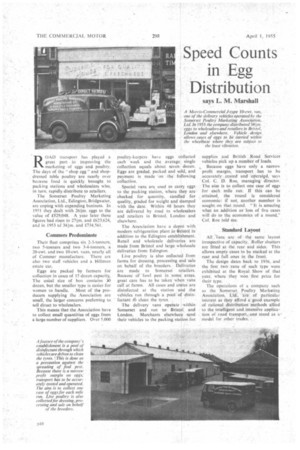Speed Counts in Egg Distribution
Page 52

If you've noticed an error in this article please click here to report it so we can fix it.
says L. M. Marshall
ROAD transport has played a great part . in improving the marketing of eggs and poultry. The days of the "shop egg" and shopdressed table poultry are nearly over because food is quickly brought to packing stations and wholesalers who, in turn, rapidly distribute to retailers.
The Somerset Poultry Marketing Association, Ltd., Edington, Bridgwater, are coping with expanding business. In 1951 they dealt with 263m. eggs to the \ alue of £529,048. A year later these figures had risen to 271m. and f623,624, and in 1953 td 341m. and 034.561.
Conuners Predominate
Their fleet comprises six 2-3-tonners, two 5-tonners and two 3-4-tonners, a 20-ewt. and two 10-cwt. vans, nearly all of Commer manufacture. There are also two staff vehicles and a Hillman estate car.
Eggs are packed by farmers for collection in cases of 15 dozen capacity. The usisial size of box contains 10 dozen, but the smaller type is easier for women to handle. Most of the producers supplying the Association are small, the larger concerns preferring to sell direct to wholesalers.
This means that the Association have to collect small quantities of eggs from a large number of suppliers. Over 5.000 poultry-keepers have eggs collected each week and the average single collection equals about seven dozen. Eggs are graded. packed and sold, and payment is made on the following collection.
Special vans are used to carry eggs to the packing station, where they are chocked for quantity, candled for quality, graded for weight and stamped with the date. Within 48 hours they are delivered by road to wholesalers and retailers in Bristol. London and elsewhere.
The Association have a depot with modern refrigeration plant in Bristol in addition to the Edington establishment. Retail and wholesale deliveries are made from Bristol and large wholesale deliveries from Edington.
Live poultry is also collected from farms for dressing, processing and sale on behalf of the breeders. Deliveries are made to Somerset retailers. Because of fowl pest in some areas. great care has to be taken when vans call at farms. All cases and crates are disinfected at the station and the vehicles run through a pool of disinfectant it clean the tyres.
The delivery vans operate within Somerset and run to Bristol and London, Merchants elsewhere send their vehicles to the packing station for supplies and British Road Services vehicles pick up a number of loads.
, Because eggs have only a narrow profit margin, transport has to be accurately costed and operatvi, says Col. C. D. Roe, managing director. The aim is to collect one case of eggs for each mile run. If this can be attained, the round is considered economic: if not, another member is sought on that round. "It is amazing what an addition or loss of five cases will do to the economics of a round," Col. Roe told me.
Standard Layout
All 'ians arc of the same layout irrespective of capacity. Roller shutters are fitted at the rear and sides. This allows empty cases to be slicked at the rear and full ones in the front.
The design dates back to 1936. and the first two vans of such type were exhibited at the Royal Show of that year. where they won first prize for their type.
The operations of a company such as the Somerset Poultry Marketing Association. Ltd., are' of 'particular interest as they afford a good example of rational .distribution methods allied to the intelligent and intensive application of road transport, and stand as a' model for other trades. .




















































































































